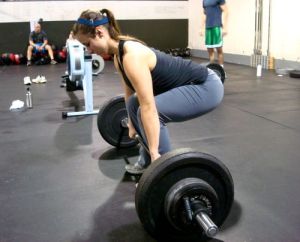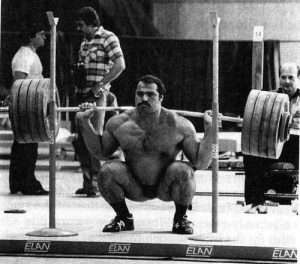 One of my biggest mistakes in times gone by was not giving leg training the attention it needed. I got away with it because of the amount of sprint work and agility training I was doing on the training paddock (don’t get me wrong – sprints and jumps are great!).
One of my biggest mistakes in times gone by was not giving leg training the attention it needed. I got away with it because of the amount of sprint work and agility training I was doing on the training paddock (don’t get me wrong – sprints and jumps are great!).
I just figured I didn’t need it. Wrong.
The occasional set of leg extensions and leg curls just doesn’t cut it. I’m so much further ahead of my old self athletically because legs (and not the mirror muscles) became my primary focus.
Squats, deads, cleans, snatches and swings.
I’m much stronger for it. I’m more athletic because of it.
Squats and Deadlifts – A Staple
I know some people freak out about “bulking up” and getting massive legs when they start to shift the focus towards squats and deads.
In my coaching experience, this very rarely happens. To bulk up the way people think it happens requires a serious calorie surplus. The squat will increase muscle definition, functionality, strength and athleticism. Squatting also gives visual “balance” – you can always pick out the guys and girls who neglect legs in favour of bicep curls. It looks kinda weird – like an upside down triangle on a flagpole.
Deadlifts are in much the same boat as squats. While both are full body lifts, it is relatively safe to say that the deadlift focuses more on the muscles that squats don’t. Hamstrings, glutes and lower back (well, the whole posterior chain) all get a great stimulus from deadlifts.
Controlling Weight With Squats and Deadlifts
If you want to lose weight, squat and deadlift. If you want to bulk up, squat and deadlift.
Keep this in mind when you’re training – it’s not the exercise that produces results, it’s how you use it.
Squats can be used to bulk up. In fact, for laying down solid muscle, I’d have to rank squats as number 1. But it requires heavy weight, high intensity and a high calorie diet. I’ve been doing the first two for years (and probably skimping on the calories) and haven’t really bulked up from it (well, maybe in the initial stages but that’s it). But I got the benefits – I’m leaner, stronger and feel better about my health and body when I squat regularly.
Reps can be varied when trying to put some size on legs. The quads in particular respond to both low and high reps. Olympic lifters have enormous legs and they rarely lift more than three reps in a set (granted their weekly frequency is high). Bodybuilders rarely lift under ten reps, and good bodybuilders also have enormous legs (Arnie and Tom Platz come to mind). Cyclists are the perfect example of quad development (especially the sprint cyclists) under high rep conditions.
In contrast to squats, I like to keep deadlift reps relatively low (I’ll come back to the reasons why).
For staying slim and maximising strength, make sure that the reps are low (five or less) and no more than three sets. Keep the weight high to maximise strength gains while reducing time under tension (a major stimulus for muscle gain). The muscle will stay conditioned, strong and primed for activity without being “bulky.”
Safety
Both the squat and deadlift are technical lifts, and need to be learned properly. A good coach can help, particularly in the initial stages. Once technique is solid, weights can be boosted as needed.
Coming back to the deadlift (as promised!), I prefer low reps for two reasons. The first is that with higher reps, form tends to deteriorate in the latter half of a high-rep set. Obviously that becomes an injury risk, as I’m sure some people can attest to. Secondly, high-rep deadlift sets tend to leave you completely fried, both muscularly and neurally. I don’t know why, but I always find that I can bounce back the next day from a brutal squat session, but not so much from deadlifts. I almost feel weak if I try and do anything hamstring or low-back dominant in the next day or two (including squats).
What Do You Think?
Do you squat or deadlift? How have you used them in the past (bulking up/slimming down/strength)?
I’m definitely interested to know if you’ve had experiences different to mine.

